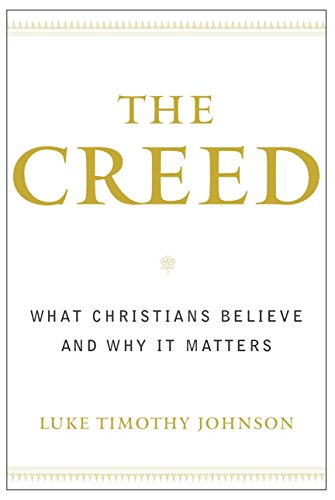Tonight we will discuss the divinity of Christ Jesus. Please read chapter 4 of Luke Timothy Johnson’s The Creed: What Christians Believe and Why it Matters. The assertion of Christ’s divinity is not simply a matter of theology, the study of God, but is primarily an issue of soteriology, the study of salvation. That Jesus must be fully God is a necessary component of the Church’s message of salvation. In the discussions over the Creed there were two primary aphorisms set forth by the orthodox party: 1) That which has not been assumed has not been healed and 2) God became man so that man could become God. If Jesus is merely human, and not God, then there is no salvation.
Gregory of Nazianzus, the primary drafter of the final language of the Creed at Constantinople (381), writes in his Epistle to Cledonius: “For that which He has not assumed He has not healed; but that which is united to His Godhead is also saved. If only half Adam fell, then that which Christ assumes and saves may be half also; but if the whole of his nature fell, it must be united to the whole nature of Him that was begotten, and so be saved as a whole.” In other words, our fallen nature is healed because God, through the Incarnation, takes this fallen nature upon himself, sanctifies it, and restores it. If Jesus is only a man or only God, then we are still dead in our sinful corrupted nature. It is only when the fullness of God assumes our very nature that we are redeemed and receive adoption as children of God in whom he is well pleased. Gal. 4:5.
In On the Incarnation, which we read a few years ago, St. Athanasius writes: “For He was made man that we might be made God; and He manifested Himself by a body that we might receive the idea of the unseen Father, and He endured the insolence of men that we might inherit immortality.” Ch.54. Therefore, at one level, Jesus is God so that we might know God. See, John 14:9. But for the divinity of Christ, we would not know the fullness of the Divine. More significantly, however, Jesus is God so that we may be restored to the image of God. in which we were created. Gen 1:26-28. Particularly, if our understanding of heaven is not geographic (a place where we are in the presence of God) but ontologic (a state of being at one with God), then the absolute necessity of Jesus being divine is given to us. See, John 17:22.
As we gather this evening, think through why it is necessary and proper that the fullness of God became incarnate. For if Jesus isn’t fully God, what does that mean for our salvation?
Dinner is at 6. Menu is pasta Bolognese. Discussion at 6:45. Hope to see you here. And if you haven’t read, please come anyway.
His divine power has granted to us all things that pertain to life and godliness, through the knowledge of him who called us to his own glory and excellence, by which he has granted to us his precious and very great promises, that through these you may escape from the corruption that is in the world because of passion, and become partakers of the divine nature.
2 Peter 1:3-4

